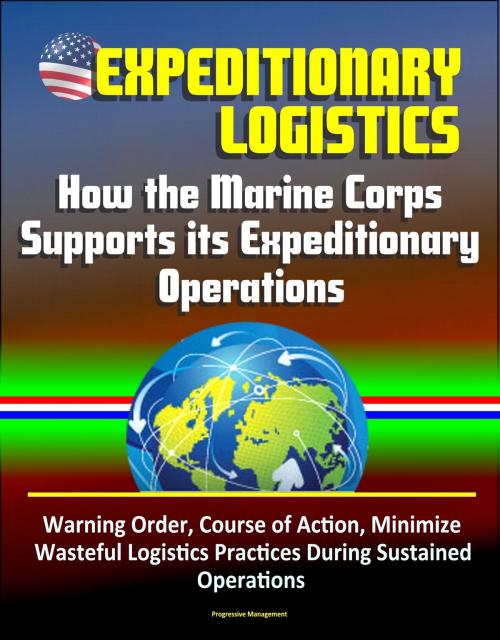Expeditionary Logistics: How the Marine Corps Supports its Expeditionary Operations, Warning Order, Course of Action, Minimize Wasteful Logistics Practices During Sustained Operations
Nonfiction, History, Military, Naval, United States| Author: | Progressive Management | ISBN: | 9781311927002 |
| Publisher: | Progressive Management | Publication: | March 12, 2016 |
| Imprint: | Smashwords Edition | Language: | English |
| Author: | Progressive Management |
| ISBN: | 9781311927002 |
| Publisher: | Progressive Management |
| Publication: | March 12, 2016 |
| Imprint: | Smashwords Edition |
| Language: | English |
Professionally converted for accurate flowing-text e-book format reproduction, this report reviews the state of expeditionary logistics within the U.S. Marine Corps. Expeditionary logistics is further defined within this thesis as the support given to an expeditionary operation. This study further categorizes expeditionary logistics according to the phase of the operation in which they occur. This insight gives greater understanding into when and where different assets and strategies are utilized in order to support Marines deployed abroad, and why the methods employed are used. A hypothetical yet realistic case study based on a Marine unit deployed in support of a humanitarian aid disaster relief mission was developed to assist with understanding the conduct of expeditionary logistics within the Marine Corps. This case study provides insight with regard to the methods employed to sustain a force abroad. The case study also provides scale and timing to aid in the general flow of supplying an expeditionary operation. This thesis provides recommendations where improvements can be made in the Marine Corps' process of conducting expeditionary operations. Further study opportunities are identified to provide guidance for further research on the conduct of Marine Corps Expeditionary Logistics.
CHAPTER I * INTRODUCTION * A. OVERVIEW * B. PURPOSE * C. SCOPE. * D. SUMMARY * CHAPTER II * BACKGROUND * A. HISTORY * B. ORGANIZATION * C. EXPEDITIONARY LOGISTICS * D. LOGISTICAL COMMAND AND CONTROL SYSTEMS * E. TYPES OF EXPEDITIONARY OPERATIONS * F. SUMMARY * CHAPTER III * LITERATURE REVIEW * CHAPTER IV * METHODOLOGY * A. PLAN * B. DESIGN * C. PREPARE * D. COLLECT * E. ANALYZE * F. SHARE * G. CASE STUDY DESCRIPTION * H. SUMMARY * CHAPTER V * CASE STUDY * A. BACKGROUND * B. WARNING ORDER * C. COURSE OF ACTION * D. INITIAL PHASE * F. RETROGRADE. * H. CONCLUSION * CHAPTER VI * ANALYSIS, RECOMMENDATIONS, AND CONCLUSIONS . * A. ANALYSIS * 1. Initial Phase of an Operation * 2. Sustainment Phase of Operations * 3. Retrograde Phase of Operations * 4. Expeditionary Logistics Training * 5. Logistical Command and Control Systems * 6. Findings to the Secondary Research Questions * B. RECOMMENDATIONS * 1. Update Doctrine * 2. Develop a USMC Logistics Practices Handbook * 3. Minimize Wasteful Logistics Practices during the Sustained Phase of Operations * 4. Integrate Strategic Asset Planning at the Lowest Level * 5. Improve Field Testing of All New Data Systems * C. CONCLUSION
Professionally converted for accurate flowing-text e-book format reproduction, this report reviews the state of expeditionary logistics within the U.S. Marine Corps. Expeditionary logistics is further defined within this thesis as the support given to an expeditionary operation. This study further categorizes expeditionary logistics according to the phase of the operation in which they occur. This insight gives greater understanding into when and where different assets and strategies are utilized in order to support Marines deployed abroad, and why the methods employed are used. A hypothetical yet realistic case study based on a Marine unit deployed in support of a humanitarian aid disaster relief mission was developed to assist with understanding the conduct of expeditionary logistics within the Marine Corps. This case study provides insight with regard to the methods employed to sustain a force abroad. The case study also provides scale and timing to aid in the general flow of supplying an expeditionary operation. This thesis provides recommendations where improvements can be made in the Marine Corps' process of conducting expeditionary operations. Further study opportunities are identified to provide guidance for further research on the conduct of Marine Corps Expeditionary Logistics.
CHAPTER I * INTRODUCTION * A. OVERVIEW * B. PURPOSE * C. SCOPE. * D. SUMMARY * CHAPTER II * BACKGROUND * A. HISTORY * B. ORGANIZATION * C. EXPEDITIONARY LOGISTICS * D. LOGISTICAL COMMAND AND CONTROL SYSTEMS * E. TYPES OF EXPEDITIONARY OPERATIONS * F. SUMMARY * CHAPTER III * LITERATURE REVIEW * CHAPTER IV * METHODOLOGY * A. PLAN * B. DESIGN * C. PREPARE * D. COLLECT * E. ANALYZE * F. SHARE * G. CASE STUDY DESCRIPTION * H. SUMMARY * CHAPTER V * CASE STUDY * A. BACKGROUND * B. WARNING ORDER * C. COURSE OF ACTION * D. INITIAL PHASE * F. RETROGRADE. * H. CONCLUSION * CHAPTER VI * ANALYSIS, RECOMMENDATIONS, AND CONCLUSIONS . * A. ANALYSIS * 1. Initial Phase of an Operation * 2. Sustainment Phase of Operations * 3. Retrograde Phase of Operations * 4. Expeditionary Logistics Training * 5. Logistical Command and Control Systems * 6. Findings to the Secondary Research Questions * B. RECOMMENDATIONS * 1. Update Doctrine * 2. Develop a USMC Logistics Practices Handbook * 3. Minimize Wasteful Logistics Practices during the Sustained Phase of Operations * 4. Integrate Strategic Asset Planning at the Lowest Level * 5. Improve Field Testing of All New Data Systems * C. CONCLUSION















